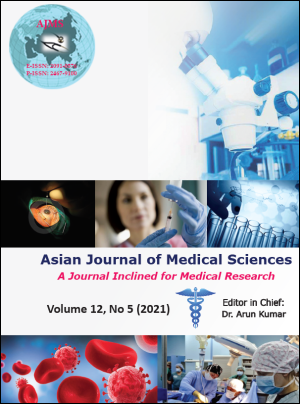Effect of intraoperative use of dexmedetomidine on post-operative analgesia in patients undergoing elective spine surgery under general anaesthesia
Keywords:
Dexmedetomidine, General anaesthesia, Analgesia, Spine surgeryAbstract
Background: Dexmedetomidine is an alpha2 agonist which shows sedative, analgesic and anti-adrenergic effects and is useful as an adjuvant agent in general anaesthesia (GA) in major surgeries.
Aims and Objectives: In this study, we evaluated the analgesic efficacy of intra-operative infusion of dexmedetomidine in alleviating post-operative pain in elective spine surgery using multiple efficacy parameters.
Materials and Methods: Patients (n=60) scheduled to undergo elective spine surgery under GA were randomised to receive either dexmedetomidine (treatment arm) or normal saline (control arm) in the intra-operative period. The analgesic efficacy of the drug in the post-operative period was assessed using- the time to first rescue analgesic, total requirement of analgesic, Visual Analog Scale (VAS) score and the number of back-up analgesic required.
Results: There was no statistically significant difference in the baseline clinical and demographic characteristics between the two groups. The time to first rescue analgesic, total requirement of analgesic, Visual Analog Scale (VAS) score and the number of back-up analgesic required, were all statistically significant in favour of the treatment arm (P<0.001).
Conclusion: Dexmedetomidine provides effective postoperative analgesia and reduces tramadol requirements in elective spine surgery performed under general anaesthesia.
Downloads
Downloads
Published
How to Cite
Issue
Section
License
Authors who publish with this journal agree to the following terms:
- The journal holds copyright and publishes the work under a Creative Commons CC-BY-NC license that permits use, distribution and reprduction in any medium, provided the original work is properly cited and is not used for commercial purposes. The journal should be recognised as the original publisher of this work.
- Authors are able to enter into separate, additional contractual arrangements for the non-exclusive distribution of the journal's published version of the work (e.g., post it to an institutional repository or publish it in a book), with an acknowledgement of its initial publication in this journal.
- Authors are permitted and encouraged to post their work online (e.g., in institutional repositories or on their website) prior to and during the submission process, as it can lead to productive exchanges, as well as earlier and greater citation of published work (See The Effect of Open Access).




